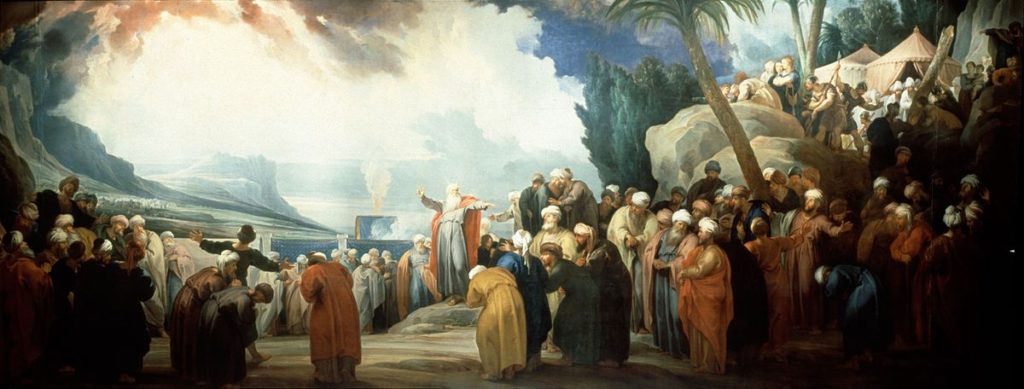Jacob de Wit painting from 1737, commissioned for the Amsterdam town hall. It depicts Moshe appointing the seventy judges.
Our parsha today is Devarim, the first Torah portion in Deuteronomy. Moshe delivers a speech, or sermon, to the Israelites, knowing that he will die soon. When we first meet Moshe, he is a man of few words, and he stumbles and stutters in his speech. But now, after a lifetime of experiences, of triumphs and failures, joys and aggravations, he delivers a message which must command the attention of not only the Israelites present with him, but also the generations to come, generations he will never meet. With his impending death, there is an urgency to his message.
Moshe recounts the history of his people, but it is a selective retelling. He barely mentions the patriarchs and the exodus from Egypt. He focuses on the Sinai experience. He talks about the problem he faced after G-d fulfilled the promise to make the Israelites as numerous as the stars of heaven. With so many people coming to him with their complaints and quarrels and petty grievances, he can hardly bear the burden. His father-in-law, Jethro, suggested, in an earlier Torah portion, that Moshe appoint judges of thousands, hundreds, fifties, and so on. But when Moshe recounts this solution, he doesn’t mention Jethro at all. He makes it sound as if it were his own idea. His narrow focus is on the charge he gives to the newly appointed judges. As Rabbi Shai Held* points out, Moshe tells the judges to “judge your brothers.” He doesn’t say at first to judge the high and mighty the same as the poor and lowly, but to treat each case as if it were a member of the judge’s own family, his brother. This Torah portion, says Rabbi Held, reminds us that promises fulfilled, advantages, and privileges lead not to glory, but to responsibility, commitment, and expectations.
The second message Moshe shares with the new judges is to fear no one. Rabbi Held talks about the problem of fear in modern Jewish communal organizations. Fear of offending the rabbi, the large donors, the board of directors, and peers. For all of us who love our Jewish organizations and want them to succeed, it takes courage sometimes to speak out. Courage is not the absence of fear, but the ability to speak out despite the fear. We need to speak up whenever we see our communal institutions losing their way, forgetting their values and mission statements. One of the things I love about Torah is that, although it was written long ago, it contains solutions to modern problems. Rabbi Held reminds us that “fear is only one factor in our decision-making, and not the most decisive one.”
*Rabbi Shai Held, The Heart of Torah: Essays on the Weekly Torah Portion, vol. 2, Jewish Publication Society, 2017.

